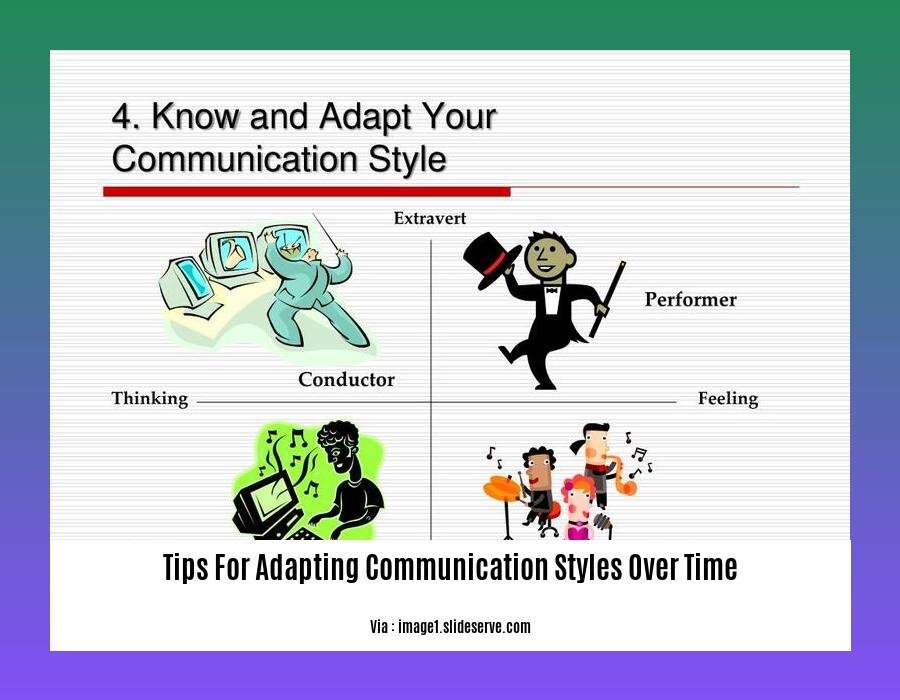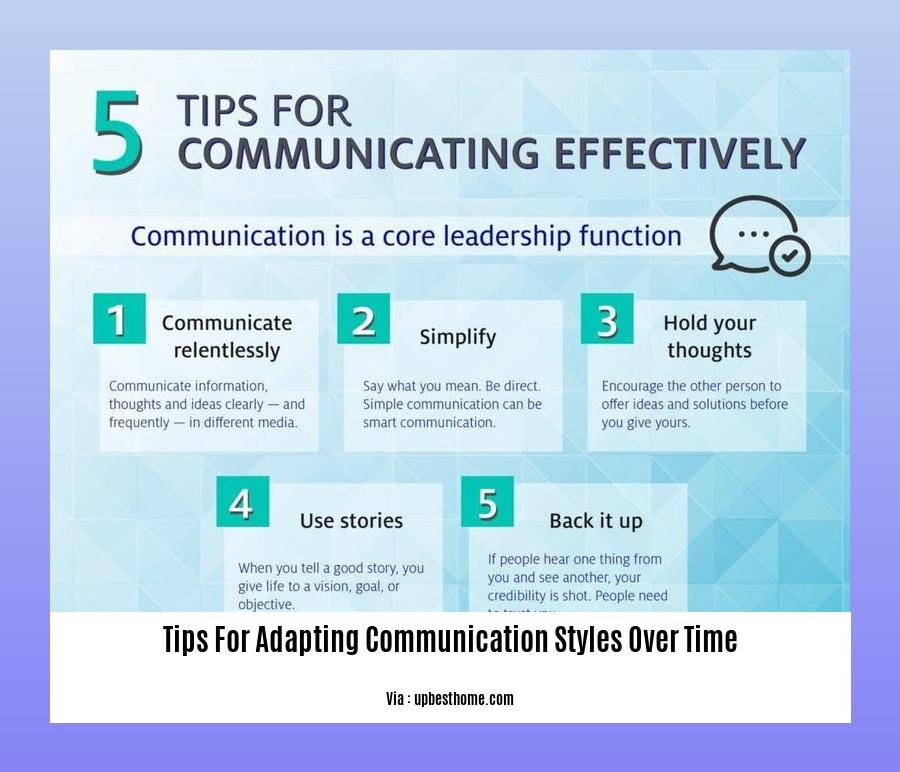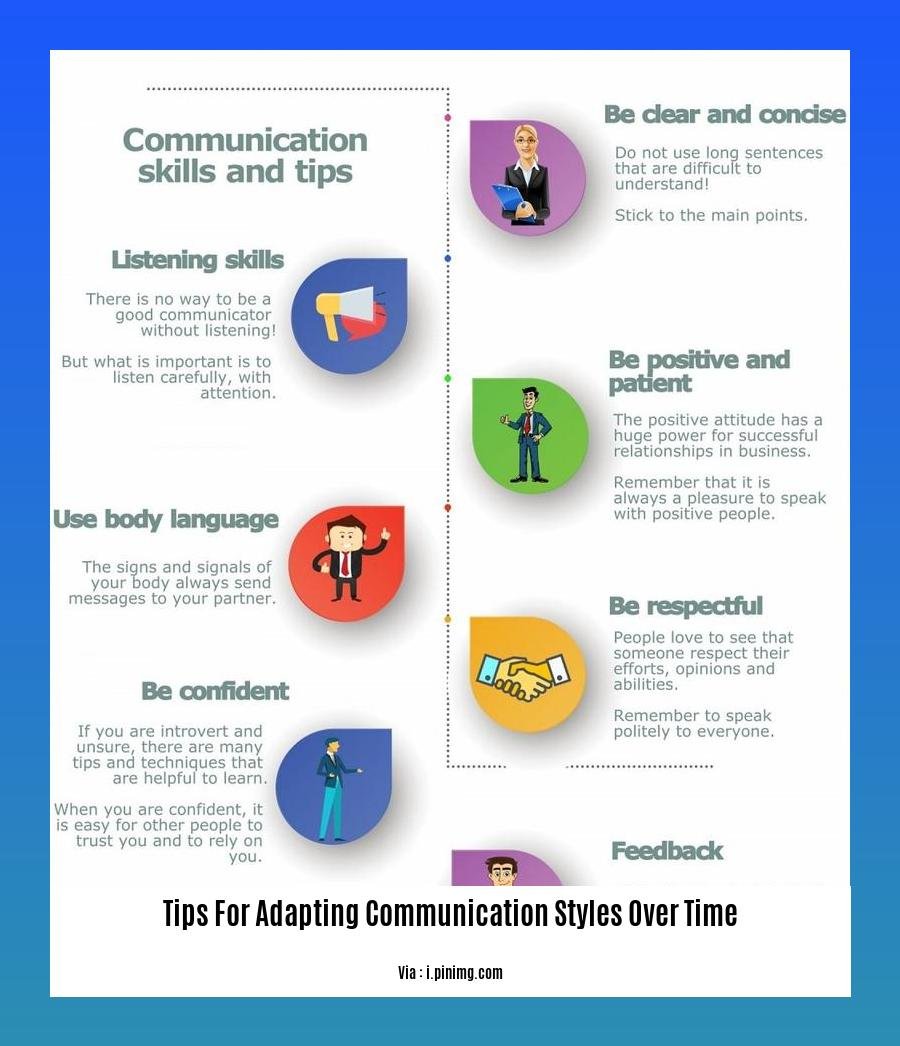In the ever-evolving landscape of communication, the ability to adapt one’s communication style is paramount. As audiences, cultural nuances, and professional contexts diversify, the need for tailored messages that resonate with diverse stakeholders becomes increasingly important. This article presents valuable tips to help individuals enhance their communication adaptability over time, ensuring that their messages remain relevant, engaging, and impactful.

Key Takeaways:
- Different communication styles exist for conveying and receiving ideas.
- Understanding the five main communication styles (assertive, aggressive, passive, passive-aggressive, and manipulative) is crucial.
- Adapting to different communication styles enhances collaboration and relationships.
Tips for Adapting Communication Styles Over Time
Communicating effectively requires adapting your style to different situations and audiences. Here are some tips for adapting communication styles over time:
Key Tips
-
Understand Different Communication Styles: Recognize the five main styles (assertive, aggressive, passive, passive-aggressive, manipulative) and their characteristics.
-
Identify Your Primary Style: Assess your own communication tendencies to build self-awareness.
-
Observe Others: Pay attention to the communication styles of others to learn from their approaches.
-
Be Flexible: Adapt your style based on the audience, context, and goal of the communication.
-
Practice Active Listening: Pay full attention to what others are saying, both verbally and nonverbally, to ensure accurate understanding.
-
Use Empathy: Put yourself in the other person’s shoes to understand their perspective and tailor your message accordingly.
-
Seek Feedback: Regularly request constructive criticism to improve your communication skills.
Adapting to Different Situations
Formal Settings:
* Use clear and concise language.
* Follow established protocols and procedures.
* Maintain a professional tone.
Informal Settings:
* Allow for more relaxed and conversational language.
* Use humor and personal anecdotes appropriately.
* Maintain a friendly and approachable demeanor.
Adapting to Different Audiences
Technical Audiences:
* Use precise and jargon-specific language.
* Provide detailed explanations and examples.
* Focus on logical arguments and data.
Non-Technical Audiences:
* Use clear and relatable language.
* Simplify complex concepts and avoid technical jargon.
* Focus on storytelling and analogies.
Tips for Effective Communication Over Time
- Stay Up-to-Date: Keep abreast of the latest communication trends and techniques.
- Embrace Technology: Utilize digital tools and platforms to enhance communication reach and efficiency.
- Customize Messages: Tailor your communication to the specific needs and interests of the audience.
- Measure Results: Track the effectiveness of your communication efforts and make adjustments as needed.
Check out communicating through different life stages in relationships to navigate the diverse conversational landscapes that emerge as you journey through life together. Explore ways to keep communication strong as your situations evolve and facilitate meaningful exchanges at every juncture. Finally, delve into discussing changing needs and roles as you progress through life to ensure that your communication remains vibrant and responsive to the ever-changing tapestry of your relationship.
Employ Professional Context
Key Takeaways:
- Understand different communication styles and your primary style.
- Observe and adapt to others’ styles.
- Use active listening and empathy to tailor messages.
- Seek feedback to improve communication skills.
- Adapt communication to formal and informal settings.
- Tailor messages to technical and non-technical audiences.
- Stay updated on communication trends and techniques.
- Customize messages to specific audience needs.
- Measure results and adjust for effectiveness.
Effective communication requires considering the context and adapting your style to suit various audiences and situations. Here’s how you can Employ Professional Context to enhance your communication skills:
-
Understand Your Audience: Identify the audience’s needs and expectations. Tailor your message to their knowledge, interests, and perspectives. Use language and examples that resonate with them.
-
Consider the Setting: Adapt your communication style to the formality of the setting. Use formal language and follow protocols in professional environments. Allow for a more relaxed tone and humor in informal settings.
-
Observe and Adapt: Pay attention to how others communicate. Observe their styles and adapt yours to complement them. This shows respect and enhances collaboration.
-
Use Empathy and Active Listening: Put yourself in your audience’s shoes to understand their viewpoint. Use active listening to clarify their needs and ensure your message is well-received.
-
Embrace Technology: Utilize technology to enhance your communication. Use video conferencing, instant messaging, and social media to connect with audiences effectively.
Source:
– “Is Your Workplace Communication Style As Effective As It Could Be?” Harvard DCE,
Utilize Ongoing Professional Development to Adapt Your Communication Skills
Continuous training is non-negotiable. You’re either picking up new knowledge and skills or getting left behind. So you need to keep your communication skills sharp.
Key Takeaways:
- To master any skill, you need to practice. Communication is no different. The more you practice, the easier it’s going to be to adapt your communication skills to any situation.
- Never stop learning. Communication skills are always developing. Keep reading, attending webinars, and taking courses to stay up-to-date.
- To develop your communication skills, you need to put yourself out there. The more you communicate with others, the better you’ll become at expressing yourself.
- Don’t be afraid to fail. Failure is an opportunity to learn. Never give up after making a mistake.
- Be open to feedback. Feedback can help you identify areas where you can improve your communication skills.
Citation:
- The Importance of Communication Skills in the Workplace
Stay Updated on Communication Landscape
In today’s rapidly evolving digital realm, it’s imperative to stay updated on the communication landscape to remain effective communicators. Here are some crucial tips to help you navigate this dynamic landscape:
Continually Monitor Trends
Stay abreast of emerging communication trends and innovative platforms. Attend industry events, subscribe to reputable sources, and participate in online discussions to gain insights into the latest advancements.
Leverage Social Media
Social media provides a vibrant platform for engaging with diverse audiences. Experiment with different platforms, optimize your content for each channel, and track your performance to fine-tune your strategy.
Master Storytelling
The ability to craft compelling narratives that resonate with your audience is essential. Utilize storytelling techniques to connect with your readers on an emotional level.
Embrace Visuals
Visuals are a powerful tool for capturing attention and conveying information effectively. Integrate images, videos, and infographics into your communication materials to enhance their appeal.
Seek Feedback
Constructive feedback is invaluable for refining your communication strategies. Regularly ask for feedback from colleagues, clients, or your audience to gather valuable insights.
Key Takeaways:
- Continuously monitor communication trends.
- Leverage social media to engage with diverse audiences.
- Master the art of storytelling to connect with readers emotionally.
- Embrace visuals to enhance the appeal of your communication materials.
- Seek feedback to refine your strategies and improve effectiveness.
Relevant URL Source:











